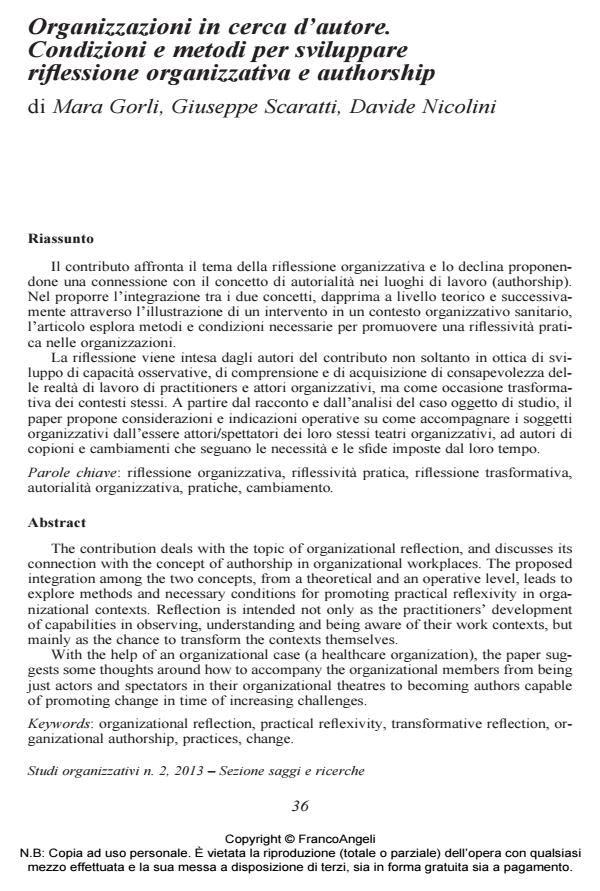Organizzazioni in cerca d’autore. Condizioni e metodi per sviluppare riflessione organizzativa e authorship
Titolo Rivista STUDI ORGANIZZATIVI
Autori/Curatori Mara Gorli, Giuseppe Scaratti, Davide Nicolini
Anno di pubblicazione 2014 Fascicolo 2013/2
Lingua Italiano Numero pagine 26 P. 36-61 Dimensione file 108 KB
DOI 10.3280/SO2013-002002
Il DOI è il codice a barre della proprietà intellettuale: per saperne di più
clicca qui
Qui sotto puoi vedere in anteprima la prima pagina di questo articolo.
Se questo articolo ti interessa, lo puoi acquistare (e scaricare in formato pdf) seguendo le facili indicazioni per acquistare il download credit. Acquista Download Credits per scaricare questo Articolo in formato PDF

FrancoAngeli è membro della Publishers International Linking Association, Inc (PILA)associazione indipendente e non profit per facilitare (attraverso i servizi tecnologici implementati da CrossRef.org) l’accesso degli studiosi ai contenuti digitali nelle pubblicazioni professionali e scientifiche
Il contributo affronta il tema della riflessione organizzativa e lo declina proponendone una connessione con il concetto di autorialità nei luoghi di lavoro (authorship). Nel proporre l’integrazione tra i due concetti, dapprima a livello teorico e successivamente attraverso l’illustrazione di un intervento in un contesto organizzativo sanitario, l’articolo esplora metodi e condizioni necessarie per promuovere una riflessività pratica nelle organizzazioni. La riflessione viene intesa dagli autori del contributo non soltanto in ottica di sviluppo di capacità osservative, di comprensione e di acquisizione di consapevolezza delle realtà di lavoro di practitioners e attori organizzativi, ma come occasione trasformativa dei contesti stessi. A partire dal racconto e dall’analisi del caso oggetto di studio, il paper propone considerazioni e indicazioni operative su come accompagnare i soggetti organizzativi dall’essere attori/spettatori dei loro stessi teatri organizzativi, ad autori di copioni e cambiamenti che seguano le necessità e le sfide imposte dal loro tempo.
Parole chiave:Riflessione organizzativa, riflessività pratica, riflessione trasformativa, autorialità organizzativa, pratiche, cambiamento.
- La formazione nel lavoro in prospettiva socio-materiale. Studio di un modello ecosistemico Claudia Banchetti, in EDUCATIONAL REFLECTIVE PRACTICES 2/2023 pp.116
DOI: 10.3280/erp2-2023oa15910
Mara Gorli, Giuseppe Scaratti, Davide Nicolini, Organizzazioni in cerca d’autore. Condizioni e metodi per sviluppare riflessione organizzativa e authorship in "STUDI ORGANIZZATIVI " 2/2013, pp 36-61, DOI: 10.3280/SO2013-002002